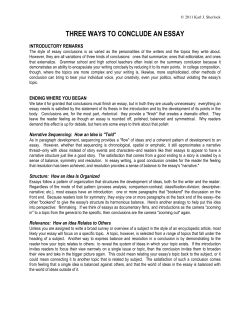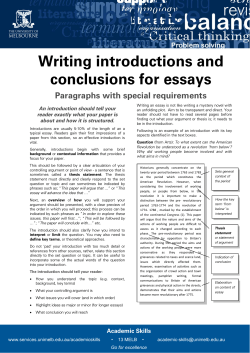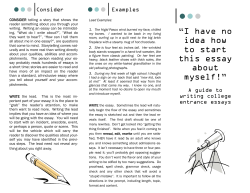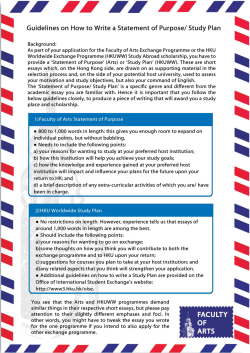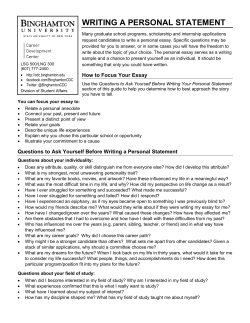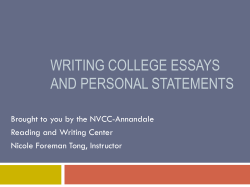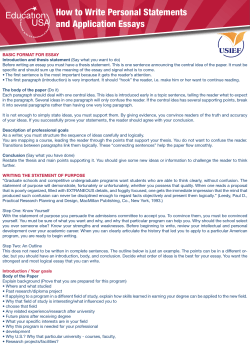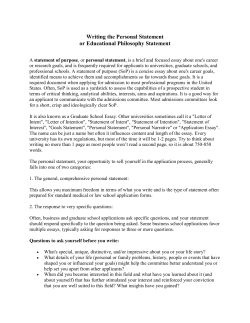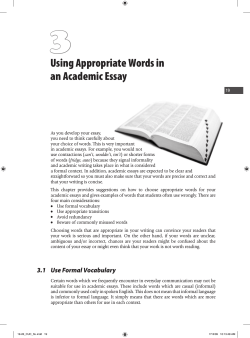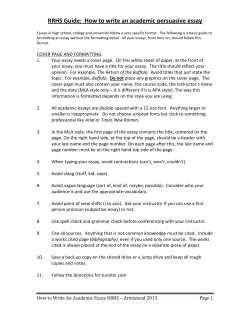
Frequently Asked Questions
Frequently Asked Questions Q: How do I begin to write my essay? A: Starting by reading the Common App and UC prompts on the next page. We'll discuss how in a bit. Q: How long should my essay be? A: It depends. Your main essay can be up to 650 words; your supplemental essays will vary. Q: How many essays will I need to write? A: Around 15 is average. These include the Common App, UC 1, UC 2, plus supplements, which number anywhere from 6 to 20, depending on the number of schools you apply to. Q: What are college admissions officers looking for? A: They're looking for the answers to these three questions: 1.) Who is this person? 2.) Will this person contribute something of value to our campus? 3.) Can this person write? Q: How do college admissions officers evaluate my essay? A: Each school has its own criteria and different readers will prefer different elements. Michael Gulotta, Senior Assistant Director of Admissions at USC, for example, has told me he most looks to the essay to assess a student's writing ability. But Rick Diaz (Regional Director of Undergraduate Admission at SMU) is less interested in writing ability and more interested in a student's story. Q: So which is more important: your story or your writing skill? A: Both are important. "A good story, well told." That's your goal. Q: What should my essay be about? A: In a word, you. Q: How do I structure my essay? A: We'll discuss two options today: Montage Structure and Narrative Structure. Q: How much do essays matter? A: It depends on the college, but generally between 10%-30%. Essays tend to matter more for small schools, or schools who look at applications holistically. Q: If my grades are bad, can I get into Harvard with a great essay? A: Nope. Schools look at your GPA, course rigor and test scores more than anything. When you're being compared to other students with similar GPA/SAT scores, that's when the essays can make or break your chances. But there are lots of other great schools besides Harvard. For a list of Colleges That Change Lives, Google "Colleges That Change Lives." Q: Can a bad college essay negatively affect my application? A: Yes. Got a question that's not answered here? Email me: ethan@collegeessayguy.com 1 ethan@collegeessayguy.com www.collegeessayguy.com Common AppLICATION Prompts 2013-2014 650 words, strict limit 1. Some students have a background or story that is so central to their identity that they believe their application would be incomplete without it. If this sounds like you, then please share your story. 2. Recount an incident or time when you experienced failure. How did it affect you, and what lessons did you learn? 3. Reflect on a time when you challenged a belief or idea. What prompted you to act? Would you make the same decision again? 4. Describe a place or environment where you are perfectly content. What do you do or experience there, and why is it meaningful to you? 5. Discuss an accomplishment or event, formal or informal, that marked your transition from childhood to adulthood within your culture, community, or family. UC Essays 1,000 words combined for UC 1 & 2, strict limit UC 1: Describe the world you come from — for example, your family, community or school — and tell us how your world has shaped your dreams and aspirations. UC 2: Tell us about a personal quality, talent, accomplishment, contribution or experience that is important to you. What about this quality or accomplishment makes you proud and how does it relate to the person you are? UC 3: If necessary, you may use this space to tell us anything else you want us to know that you have not had the opportunity to describe elsewhere in the application. 2 ethan@collegeessayguy.com www.collegeessayguy.com 1 What do I write about? 3 ethan@collegeessayguy.com www.collegeessayguy.com Essence Objects Exercise To listen to the College Essay Guy guide you through this exercise, go here: www.collegeessayguy.com/guide-objects-exercise 4 ethan@collegeessayguy.com www.collegeessayguy.com What do I value? community inspiration money intellectual status financial gain laughter serenity physical challenge responsibility competition career fame working with others freedom security strength self-control hunger personal development trust faith involvement adventure vulnerability adaptability friendship excellence job tranquility power passion cooperation affection wisdom knowledge growth expertise order privacy self expression stability art autonomy risk balance self-discipline courage family empathy working alone humility efficiency intensity health and fitness meaningful work my country music truth resourcefulness challenges commitment leadership helping others influence wit success patience listening diversity love fast-paced work nutrition 5 competence practicality creativity excitement collaboration social change beauty ecological awareness quality relationships travel decisiveness curiosity spirituality loyalty honesty independence supervising others recognition accountability democracy close relationships religion respect bravery communication change and variety compassion nature __________________ __________________ __________________ __________________ ethan@collegeessayguy.com www.collegeessayguy.com What’s your story? Finding the Right Clay Think of essay writing as sculpting. Your working to sculpt an essay that reflects something true about who you are. But first you need the right clay. How can you be absolutely sure you're sculpting with the right clay? You can't. But here’s a tip: Tell your deepest story. I was part of a story circle once in which we were asked to tell our deepest story. And that’s my advice to you. So what’s your deepest story? These questions may help: ! What’s the toughest lesson you’ve ever had to learn? ! What was the hardest thing you ever had to overcome? ! What is your life question? ! Describe a time when your belief system was formed, tested or changed ! I wouldn’t be who I am today without ____________________________. ! (If you have a specific career/major in mind) Why am I a [writer/doctor/teacher]? ! What experience shifted your molecules? (In other words: you were one way. Then [this thing] happened. Then you were another way.) 6 ethan@collegeessayguy.com www.collegeessayguy.com 2 How do I structure my essay? 7 ethan@collegeessayguy.com www.collegeessayguy.com Four Types of College Essays A B Student has faced significant challenges and knows what s/he wants to study. Student has not faced significant challenges, but does know what s/he wants to study. C D Student has faced significant challenges, but does not know what s/he wants to study. Student has not faced significant challenges and does not know what s/he wants to study. A few notes on how to use this document: I believe a good college essay should either: 1.) go deep, discussing one moment that fundamentally changed your life, or 2.) go wide, discussing many different elements of your life. Narrative Structure will help you go deep. Montage Structure will help you go wide. Note before we begin: I don’t believe people can generally be reduced to “types.” So if it pains you to think of yourself as a “type” of student, just think of these as different types of strategies. It’s also important to note that these categories are fluid and it’s possible to move from one to another. A student who has faced significant challenges but doesn’t know what s/he wants to study (Category C), for example, may discover, through a process of research or counseling, what s/he would like to study and so move to Category A. Similarly, a student who has not faced significant challenges and does not know what s/he wants to study (Category D) may discover, through self-reflection or counseling, that s/he has indeed faced significant challenges, and so move to Category C. I recommend reading all the examples; you never know what might resonate. Finally: There is no surefire approach for essay writing. No essay will, on its own, get a student into a college. Many different students are accepted to colleges each year with many different types of essays. Having said that, the task of the college essay is to shape the student’s life into a coherent narrative. What follows are some strategies that have helped some of my students do just that. 8 ethan@collegeessayguy.com www.collegeessayguy.com Let’s take a look at two different types of structure: Narrative Structure Here’s the structure that most American films use. Learning this may change the way you watch films (it did for me). It’s a structure as old as time and storytellers have been using it for thousands of years. Joseph Campbell called it the monomyth or Hero’s Journey. I’ll refer to as narrative structure. Its basic elements are: 1. 2. 3. 4. 5. Status Quo Inciting Incident / Status Quo Change Raise the stakes Moment of Truth Outcome / New Status Quo Status Quo Life as is. The hero, our main character, is living his/her normal life. Inciting Incident / Status Quo Change One day, something happens. A boy discovers he is a wizard (Harry Potter). A girl falls down a rabbit hole (Alice in Wonderland). A murder happens (almost every mystery). You get the idea. In short, the hero is called to adventure. Raising the Stakes Things get more dangerous and important. In small dramas, the events become more important inwardly, to our main characters’ personal lives, threatening to change them forever. In action movies, events become more important outwardly, escalating until not only our characters’ lives are threatened, but the country, the world, then (in big budget films) Civilization as We Know It. In some films, the character’s inward journey (what s/he must learn) and outward journey (what s/he must do) are intertwined. See: Star Wars, Avatar, The Dark Knight. Moment of Truth The climax. The moment of highest tension. The character must make the Ultimate Choice or fight the Ultimate Battle. Will Beauty kiss the Beast and save his life? (Beauty and the Beast) Will Neo realize—and accept—his role as The One before it’s too late? (The Matrix) Will Frodo destroy the Ring and save Middle Earth? (Lord of the Rings) Outcome / New Status Quo The result. Montage Structure What is a montage? Montage is a technique that involves creating a new whole from separate fragments (pictures, words, music, etc.). In filmmaking, the montage effect is used to condense space and time so that information can be delivered in a more efficient way. 9 ethan@collegeessayguy.com www.collegeessayguy.com Take the classic “falling in love” montage, commonly used in romantic comedies. We don’t see every single interaction; instead, we see: he surprises her at work with flowers, they walk through the park, they dance in the rain, they pass an engagement ring store and she eyes a particular ring. You get the idea. A few images tell the whole story. And you can use this technique for your essay. But which essences should you choose? That’s up to you. (It’s art, remember, not science.) Find a Focusing Lens The Type D “Scrapbook” essays below employs what I call a focusing lens. You can’t discuss every single aspect of your life, but you can show us a few important points through a single lens or metaphor. What type of focusing lens might you use to write your essay? A sport? A place? An art form? A hobby? Ask yourself: what’s something I know really well? Tips for finding a good focusing lens 1.) Make it visual. Storytelling is a visual medium. Use a lens that will help conjure images in the reader’s mind. I’ve had too many students try to write “soundtrack” or “mix-tape” essays in which their favorite songs provide the soundtrack for their lives. The problem with writing this type of essay, however, is that the reader can’t hear the music (and often doesn’t know or have the same emotional connection to the songs referenced). 2.) Write what you know. Know how to cook? Use food. Play chess? Use that! Use your essence objects list (see below) for ideas. 3.) Find a focusing lens that allows you to “go wide.” Use a metaphor, in other words, that will allow you to discuss several different aspects of who you are. Note how the scrapbooking lens allowed the writer to discuss more than two dozen different essences. 10 ethan@collegeessayguy.com www.collegeessayguy.com Sample Essay A: “With Debate” Essay Written by a student who has faced significant challenges and did know what she wanted to study. The clock was remarkably slow as I sat, legs tightly crossed, squirming at my desk. “Just raise your hand,” my mind pleaded, “ask.” But despite my urgent need to visit the restroom, I remained seated, begging time to move faster. You see, I was that type of kid to eat French Fries dry because I couldn’t confront the McDonalds cashier for some Heinz packets. I was also the type to sit crying in front of school instead of asking the office if it could check on my late ride. Essentially, I chose to struggle through a problem if the solution involved speaking out against it. My diffidence was frustrating. My parents relied on me, the only one able to speak English, to guide them, and always anticipated the best from me. However, as calls for help grew, the more defunct I became. I felt that every move I made, it was a gamble between success and failure. For me, the fear of failure and disappointment far outweighed the possibility of triumph, so I took no action and chose to silently suffer under pressure. Near meltdown, I knew something needed to be done. Mustering up the little courage I had, I sought ways to break out of my shell—without luck. Recreational art classes ended in three boring months. I gave up Self Defense after embarrassing myself in class. After-school band, library volunteering, and book clubs ended similarly. Continued effort yielded nothing. Disillusioned and wrung dry of ideas, I followed my mom’s advice and joined a debate club. As expected, the club only reaffirmed my self-doubt. Eye contact? Greater volume? No thanks. But soon, the club moved on from “how to make a speech” lessons to the exploration of argumentation. We were taught to speak the language of Persuasion, and play the game of Debate. Eventually, I fell in love with it all. By high school, I joined the school debate team, began socializing, and was even elected to head several clubs. I developed critical and analytical thinking skills, and learned how to think and speak spontaneously. I became proud and confident. Moreover, I became eager to play my role in the family, and family relations strengthened. In fact, nowadays, my parents are interested in my school’s newest gossip. Four years with debate, and now I’m the kid up at the white board; the kid leading discussions; and the kid standing up for her beliefs. More importantly, I now confront issues instead of avoiding them. It is exciting to discover solutions to problems that affect others, as I was able to do as part of the 1st Place team for the 2010 United Nations Global Debates Program on climate change and poverty. I take a natural interest in global issues, and plan to become a foreign affairs analyst or diplomat by studying international affairs with a focus on national identity. In particular, I am interested in the North-South Korean tension. What irreconcilable differences have prompted a civilization to separate? Policy implications remain vague, and sovereignty theories have their limits—how do we determine what compromises are to be made? And on a personal level, why did my grandfather have to flee from his destroyed North Korean hometown--and why does it matter? I see a reflection of myself in the divide at the 38th parallel because I see one part isolating itself in defense to outside threats, and another part coming out to face the world as one of the fastest- developing nations. Just as my shy persona before debate and extroverted character after debate are both part of who I am, the Korean civilization is also one. And just as my parents expect much from me, the first of my family to attend college, I have grand expectations for this field of study. 11 ethan@collegeessayguy.com www.collegeessayguy.com Sample Essay B: “Endodontics” Essay Written by a student who has not faced significant challenges but did know what he wanted to study. As a kid I was always curious. I was unafraid to ask questions and didn’t worry how dumb they would make me sound. In second grade I enrolled in a summer science program and built a solar-powered oven that baked real cookies. I remember obsessing over the smallest details: Should I paint the oven black to absorb more heat? What about its shape? A spherical shape would allow for more volume, but would it trap heat as well as conventional rectangular ovens? Even then I was obsessed with the details of design. And it didn’t stop in second grade. A few years later I designed my first pair of shoes, working for hours to perfect each detail, including whether the laces should be mineral white or diamond white. Even then I sensed that minor differences in tonality could make a huge impact and that different colors could evoke different responses. In high school I moved on to more advanced projects, teaching myself how to take apart, repair, and customize cell phones. Whether I was adjusting the flex cords that connect the IPS LCD to the iPhone motherboard, or replacing the vibrator motor, I loved discovering the many engineering feats Apple overcame in its efforts to combine form with function. And once I obtained my driver’s license, I began working on cars. Many nights you’ll find me in the garage replacing standard chrome trim with an elegant piano black finish or changing the threads on the stitching of the seats to add a personal touch, as I believe a few small changes can transform a generic product into a personalized work of art. My love of details applies to my schoolwork too. I’m the math geek who marvels at the fundamental theorems of Calculus, or who sees beauty in A=(s (s-a)(s-b)(s-c))^(1/2). Again, it’s in the details: one bracket off or one digit missing and the whole equation collapses. And details are more than details, they can mean the difference between negative and positive infinity, an impossible range of solutions. I also love sharing this appreciation with others and have taken it upon myself to personally eradicate mathonumophobiconfundosis, my Calculus teacher’s term for “extreme fear of Math.” A small group of other students and I have devoted our after-school time to tutoring our peers in everything from PreAlgebra to AP Calculus B/C and I believe my fluency in Hebrew and Farsi has helped me connect with some of my school’s Israeli and Iranian students. There’s nothing better than seeing a student solve a difficult problem without me saying anything. You probably think I want to be a designer. Or perhaps an engineer? Wrong. Well, kind of. Actually, I want to study Endodontics, which is (I’ll save you the Wikipedia look-up) a branch of dentistry that deals with the tooth pulp and the tissues surrounding the root of a tooth. As an Endodontist, I’ll be working to repair damaged teeth by performing precision root canals and implementing dental crowns. Sound exciting? It is to me. The fact is, it’s not unlike the work I’ve been doing repairing cellphone circuits and modifying cars, though there is one small difference. In the future I’ll still be working to repair machines, but this machine is one of the most sophisticated machines ever created: the human body. Here, my obsession with details will be as crucial as ever. A one millimeter difference can mean the difference between a successful root canal and a lawsuit. The question is: will the toothbrushes I hand out be mineral white or diamond white? 12 ethan@collegeessayguy.com www.collegeessayguy.com Sample Essay C: The “Raising Anthony” Essay Written by a student who did face challenges, but did not know what she wanted to study. At age three, I was separated from my mother. The court gave full custody of both my baby brother and me to my father. Of course, at my young age, I had no clue what was going on. However, it did not take me long to realize that life with my father would not be without its difficulties. My brother, Anthony, was eleven months old when my father placed us in the hands of our first babysitter. I remember being confused at first, wondering where my father had gone and when he would be back, but after a while, I became accustomed to this routine of absence and the never ending babysitters that filled in for him. These strangers consisted of college students, chain-smokers, senile women, and foreigners —all were technically adults, but not one was a suitable substitute for a parent. When my father was home, he still seemed absent; he was distant both physically and emotionally. He was busy bouncing from one girlfriend to the next, sleeping in until 1:30 in the afternoon, and sitting on the couch watching television. He took us out to restaurants every night and wasted the money he earned on expensive dinners, his current girlfriend, and liquor. This continued for ten years. Legally, we had all the necessities to survive, but in truth our home was devoid of structure. Schoolwork went unchecked. Bedtimes were unregulated. Dust accumulated in thick layers on the paperwork that overflowed on the dining table. Often times, Anthony and I would spend hours waiting at school for someone to pick us up, and most of our dinners were served well past eleven at night. Consequentially, and quite unwittingly, I shed my childhood and assumed the role of “parent” for Anthony before my seventh birthday. I memorized the routes we took to school and led Anthony home myself. I watched professional chefs on PBS and learned how to cook basic meals for two. Unfortunately, as I progressively developed into the parent, Anthony took advantage of our lack of true authority and grew into the epitome of a problem child. He became unruly, and his behavior soon bled into his school life. His grades suffered and he seemed to act out more often. His rash temper continued to grow until one day the school called our home because he had tried to throw a chair at his teacher. Anthony was the only kindergartner in our school’s history to be suspended. The school counselor recommended that when my father was in town we attend therapy as a family. But that accomplished nothing —my father’s initial attempts to implement authority devolved quickly into apathy, and then he was traveling again. I, on the other hand, would not give up so easily. I became the watchful eye and mentor that Anthony and I both needed. I soaked in the parenting videos that our family counselor had given my dad. I explained to Anthony why a structured lifestyle is important and why retribution is needed for one’s misdeeds. To further instill selfdiscipline in him, I would have him formulate his own penalties. I also began to follow up on his schoolwork by contacting his teachers. On one particularly hopeful afternoon I even tried to introduce him to books that I had read— but I learned I can't win every battle. I wasn’t satisfied with just giving a fish to my little brother; I wanted to teach him how to cast lines himself and learn the tools of self-reliance. Looking back at my hectic childhood, I am grateful for the insight it afforded me, and I am grateful for the effect my little brother had on me. Inadvertently, by raising Anthony I ended up raising myself. Living with my unreliable father and reliant younger brother gave me the need and incentive to find myself and to mature quickly. At a very early age I became resourceful, independent, and responsible. It makes me proud to know that I singlehandedly raised Anthony and myself. I now know that I can face any challenge with confidence. Even if I don’t succeed, I know I will be stronger just for trying. 13 ethan@collegeessayguy.com www.collegeessayguy.com Sample Essay D: The “Five Families” Essay By a student who did not face challenges and did not know what he wanted to study. When I was 16, I lived with the Watkins family in Wichita, Kansas. Mrs. Watkins was the coordinator of the foreign exchange student program I was enrolled in. She had a nine- year- old son named Cody. I would babysit Cody every day after school for at least two to three hours. We would play Scrabble or he would read to me from Charlotte’s Web or The Ugly Duckling. He would talk a lot about his friends and school life, and I would listen to him and ask him the meanings of certain words. He was my first friend in the New World. My second family was the Martinez family, who were friends of the Watkins’s. The host dad Michael was a high school English teacher and the host mom Jennifer (who had me call her “Jen”) taught elementary school. She had recently delivered a baby, so she was still in the hospital when I moved into their house. The Martinez family did almost everything together. We made pizza together, watched Shrek on their cozy couch together, and went fishing on Sunday together. On rainy days, Michael, Jen and I would sit on the porch and listen to the rain, talking about our dreams and thoughts. Within two months I was calling them mom and dad. After I finished the exchange student program, I had the option of returning to Korea but I decided to stay in America. I wanted to see new places and meet different people. Since I wasn’t an exchange student anymore, I had the freedom--and burden--of finding a new school and host family on my own. After a few days of thorough investigation, I found the Struiksma family in California. They were a unique group. The host mom Shellie was a single mom who had two of her own sons and two Russian daughters that she had adopted. The kids always had something warm to eat, and were always on their best behavior at home and in school. It would be fair to say that this was all due to Shellie’s upbringing. My room was on the first floor, right in front of Shellie’s hair salon, a small business that she ran out of her home. In the living room were six or seven huge amplifiers and a gigantic chandelier hung from the high ceiling. The kitchen had a bar. At first, the non-stop visits from strangers made me nervous, but soon I got used to them. I remember one night, a couple barged into my room while I was sleeping. It was awkward. After a few months I realized we weren’t the best fit. In the nicest way possible, I told them I had to leave. They understood. The Ortiz family was my fourth family. Kimberly, the host mom, treated me the same way she treated her own son. She made me do chores: I fixed dinner, fed their two dogs Sassy and Lady, and once a week I cleaned the bathroom. I also had to follow some rules: No food in my room, no using the family computer, no lights on after midnight, and no ride unless it was an emergency. The first couple of months were really hard to get used to, but eventually I adjusted. I lived with the Ortiz family for seven months like a monk in the deep forest. However, the host dad Greg’s asthma got worse after winter, so he wanted to move to the countryside. It was unexpected and I only had a week to find a new host family. I asked my friend Danielle if I could live with her until I found a new home. That’s how I met the Dirksen family, my fifth family. The Dirksen family had three kids. They were all different. Danielle liked bitter black coffee, Christian liked energy drinks, and Becca liked sweet lemon tea. Dawn, the host mom didn’t like winter, and Mark, the host dad, didn’t like summer. After dinner, we would all play Wii Sports together. I was the king of bowling, and Dawn was the queen of tennis. I don’t remember a single time that they argued about the games. Afterward, we would gather in the living room and Danielle would play the piano while the rest of us sang hymns. Of course, those 28 months were too short to fully understand all five families, but I learned from and was shaped by each of them. By teaching me English, nine year-old Cody taught me the importance of being able to learn from anyone; the Martinez family showed me the value of spending time together as a family; the Struiksma family taught me to reserve judgment about divorced women and adopted children; Mrs. Ortiz taught me the value of discipline and the Dirksen family taught me the importance of appreciating one another’s different qualities. Getting along with other people is necessary for anyone and living with five families has made me more sensitive to others’ needs: I have learned how to recognize when someone needs to talk, when I should give advice and when to simply listen, and when someone needs to be left alone; in the process, I have become much more adaptable. I’m ready to change, learn, and be shaped by my future families. 14 ethan@collegeessayguy.com www.collegeessayguy.com At collegeessayguy.com you’ll discover: How to Create the Simplest, Best To-Do List Ever 5 Ways to Make Your Activities List Awesome Which Common App Essay Prompt is Best? Two Spaces After a Period (And four other mistakes your making in you're college essay) How to Create a Great College List How to Write a "Why Us" Essay Ten Tips for Writing a 1337* UC2 Essay How to Decide Which Extracurricular Activity to Write About How to Make a Mediocre Extracurricular Essay Better (in about 30 minutes) Four Qualities of an Amazing Essay Why You Should Probably Set Your Facebook Settings to Private After Sending in Your Common App How Much Do SAT Scores Matter? (A Paradox) How to Write Your 150-Word Extracurricular Essay (Six Techniques You Can Steal) How to Write a "Why us" Essay for a School You're Not Super Excited About DOs and DON'Ts for Your "Why Us?" Statement Why I Keep a Gratitude List 5 Resources that will save you $3,480 Five FAFSA myths--busted College Interviews: How much do they really matter? Five Common Myths About College Majors How Senioritis Can Earn You a “Fear of God” Letter How to Choose Your Major 15 ethan@collegeessayguy.com www.collegeessayguy.com Quiz Take a look at the two essays on the following pages and decide if each one is: Narrative or montage structure? Which of the four types? A B Student has faced significant challenges and knows what s/he wants to study. Student has not faced significant challenges, but does know what s/he wants to study. C D Student has faced significant challenges, but does not know what s/he wants to study. Student has not faced significant challenges and does not know what s/he wants to study. For discussion: how could the essays be improved? 16 ethan@collegeessayguy.com www.collegeessayguy.com Additional Common App Essay #1 I look at the ticking, white clock: it’s eleven at night, my primetime. I clear the carpet of the Sony camera charger, the faded Levi’s, and last week’s Statistics homework. Having prepared my work space, I pull out the big, blue box and select two 12 by 12 crème sheets of paper. The layouts of the pages are already imprinted in my mind, so I simply draw them on scratch paper. Now I can really begin. Cutting the first photograph, I make sure to leave a quarter inch border. I then paste it onto a polkadotted green paper with a glue stick. For a sophisticated touch, I use needle and thread to sew the papers together. Loads of snipping and pasting later, the clock reads three in the morning. I look down at the final product, a full spread of photographs and cut-out shapes. As usual, I feel an overwhelming sense of pride as I brush my fingers over the crisp papers and the glossy photographs. For me, the act of taking pieces of my life and putting them together on a page is my way of organizing remnants of my past to make something whole and complete. This particular project is the most valuable scrapbook I have ever made: the scrapbook of my life. In the center of the first page are the words MY WORLD in periwinkle letters. The entire left side I have dedicated to the people in my life. All four of my Korean grandparents sit in the top corner; they are side by side on a sofa for my first birthday –my ddol. Underneath them are my seven cousins from my mom’s side. They freeze, trying not to let go of their overwhelming laughter while they play “red light, green light” at O’ Melveney Park, three miles up the hill behind my house. Meanwhile, my Texas cousins watch Daniel, the youngest, throw autumn leaves into the air that someone had spent hours raking up. To the right, my school peers and I miserably pose for our history teacher who could not resist taking a picture when he saw our droopy faces the morning of our first AP exam. The biggest photograph, of course, is that of my family, huddled in front of the fireplace while drinking my brother’s hot cocoa and listening to the pitter patter of rain outside our window. I move over to the right side of the page. At the top, I have neatly sewn on three items. The first is a page of a Cambodian Bible that was given to each of the soldiers at a military base where I taught English. Beneath it is the picture of my Guatemalan girls and me sitting on the dirt ground while we devour arroz con pollo, red sauce slobbered all over our lips. I reread the third item, a short note that a student at a rural elementary school in Korea had struggled to write in her broken English. I lightly touch the little chain with a dangling letter E included with the note. Moving to the lower portion of the page, I see the photo of the shelf with all my ceramic projects glazed in vibrant hues. With great pride, I have added a clipping of my page from the Mirror, our school newspaper, next to the ticket stubs for Wicked from my date with Dad. I make sure to include a photo of my first scrapbook page of the visit to Hearst Castle in fifth grade. After proudly looking at each detail, I turn to the next page, which I’ve labeled: AND BEYOND. Unlike the previous one, this page is not cluttered or crowded. There is my college diploma with the major listed as International Relations; however, the name of the school is obscure. A miniature map covers nearly half of the paper with numerous red stickers pinpointing locations all over the world, but I cannot recognize the countries’ names. The remainder of the page is a series of frames and borders with simple captions underneath. Without the photographs, the descriptions are cryptic. For now, that second page is incomplete because I have no precise itinerary for my future. The red flags on the map represent the places I will travel to, possibly to teach English like I did in Cambodia or to do charity work with children like I did in Guatemala. As for the empty frames, I hope to fill them with thepeople I will meet: a family of my own and the families I desire to help, through a career I have yet to decide. Until I am able to do all that, I can prepare. I am in the process of making the layout and gathering the materials so that I can start piecing together the next part, the next page of my life’s scrapbook. 17 ethan@collegeessayguy.com www.collegeessayguy.com Additional Common App Essay #2 Prompt: Evaluate a significant experience, risk, achievement, ethical dilemma you have faced and its impact on you. Smeared blood, shredded feathers. Clearly, the bird was dead. But wait, the slight fluctuation of its chest, the slow blinking of its shiny black eyes. No, it was alive. I had been typing an English essay when I heard my cat's loud meows and the flutter of wings. I had turned slightly at the noise and had found the barely breathing bird in front of me. The shock came first. Mind racing, heart beating faster, blood draining from my face. I instinctively reached out my hand to hold it, like a long-lost keepsake from my youth. But then I remembered that birds had life, flesh, blood. Death. Dare I say it out loud? Here, in my own home? Within seconds, my reflexes kicked in. Get over the shock. Gloves, napkins, towels. Band-aid? How does one heal a bird? I rummaged through the house, keeping a wary eye on my cat. Donning yellow rubber gloves, I tentatively picked up the bird. Never mind the cat's hissing and protesting scratches, you need to save the bird. You need to ease its pain. But my mind was blank. I stroked the bird with a paper towel to clear away the blood, see the wound. The wings were crumpled, the feet mangled. A large gash extended close to its jugular rendering its breathing shallow, unsteady. The rising and falling of its small breast slowed. Was the bird dying? No, please, not yet. Why was this feeling so familiar, so tangible? Oh. Yes. The long drive, the green hills, the white church, the funeral. The Chinese mass, the resounding amens, the flower arrangements. Me, crying silently, huddled in the corner. The Hsieh family huddled around the casket. Apologies. So many apologies. Finally, the body lowered to rest. The body. Kari Hsieh. Still familiar, still tangible. Hugging Mrs. Hsieh, I was a ghost, a statue. My brain and my body competed. Emotion wrestled with fact. Kari Hsieh, aged 17, my friend of four years, had died in the Chatsworth Metrolink Crash on Sep. 12, 2008. Kari was dead, I thought. Dead. But I could still save the bird. My frantic actions heightened my senses, mobilized my spirit. Cupping the bird, I ran outside, hoping the cool air outdoors would suture every wound, cause the bird to miraculously fly away. Yet there lay the bird in my hands, still gasping, still dying. Bird, human, human, bird. What was the difference? Both were the same. Mortal. But couldn't I do something? Hold the bird longer, de-claw the cat? I wanted to go to my bedroom, confine myself to tears, replay my memories, never come out. The bird's warmth faded away. Its heartbeat slowed along with its breath. For a long time, I stared thoughtlessly at it, so still in my hands. Slowly, I dug a small hole in the black earth. As it disappeared under handfuls of dirt, my own heart grew stronger, my own breath more steady. The wind, the sky, the dampness of the soil on my hands whispered to me, “The bird is dead. Kari has passed. But you are alive.” My breath, my heartbeat, my sweat sighed back, “I am alive. I am alive. I am alive.” 18 ethan@collegeessayguy.com www.collegeessayguy.com
© Copyright 2025
